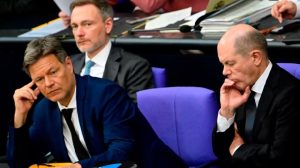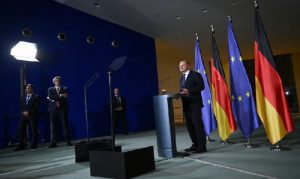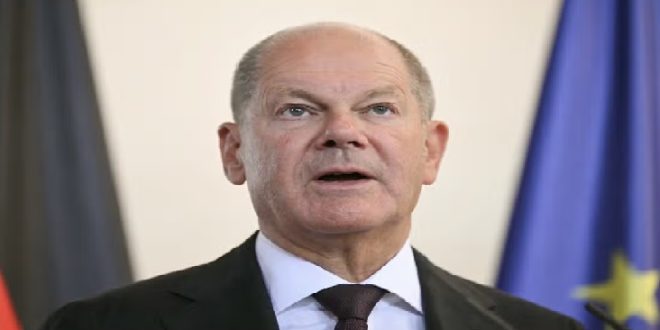08-11-2024
BERLIN: Germany’s governing coalition is in crisis after Chancellor Olaf Scholz fired a key minister and said he would call a vote of confidence in his government early next year.
Scholz said he had no trust in Finance Minister Christian Lindner, who leads a rival party that has been part of the coalition along with Scholz’s Social Democrats and the Greens.
 The move means Scholz’s government no longer has a majority in parliament. The confidence vote could lead to early elections by March.
The move means Scholz’s government no longer has a majority in parliament. The confidence vote could lead to early elections by March.
The so-called “traffic light” coalition led by the chancellor has governed Germany since 2021 but internal tensions had been bubbling for weeks before exploding into the open on Wednesday night.
Scholz said his former finance minister had “betrayed my confidence” and had put the interests of his party base over those of the country.
He added that Germany needed to show it could be relied upon by other countries, particularly following the election of Donald Trump in the US.
Lindner accused Scholz of “leading Germany into a phase of uncertainty”.
The crisis inside the coalition plunged Europe’s largest economy into political chaos, hours after Trump’s election triggered deep uncertainty about the future of the continent’s economy and security.
When the coalition between the chancellor’s centre-left Social Democrats, the environmentalist Greens and economically liberal FDP was formed in 2021, each party planned to spend big on its own individual core interest groups.
However, Russia’s full-scale invasion of Ukraine in 2022 sent energy prices surging, and left Germany facing an increase in defence spending and the cost of taking in 1.5 million Ukrainian refugees.
Germany is now facing its second year without economic growth.
Scholz and his Green partners want tackle this by loosening constitutional rules on public debt to allow more spending. Lindner wants to pay for tax cuts by slashing welfare and social budgets and pushing back environmental targets.
 Economy Minister Robert Habeck of the Greens said the party would not quit the government and that its ministers would remain in office.
Economy Minister Robert Habeck of the Greens said the party would not quit the government and that its ministers would remain in office.
Scholz announced that a vote of confidence would be held in Germany’s parliament, the Bundestag, on 15 January.
If MPs vote down the government, the country would hold fresh elections within weeks, instead of the scheduled date in September.
Yesterday, German police have arrested eight suspected members of a far-right group, which was allegedly plotting to mount a Nazi-inspired coup.
Prosecutors said the group known as the Saechsische Separatist or “Saxony Separatists” was undertaking military training for the collapse of the German government and society, which it believed would come on an unspecified “Day X”.
After that date, the group allegedly planned to seize control over areas of eastern Germany by force and establish a far-right regime.
More than 450 officers carried out searches and arrests across Germany, Austria and Poland in an effort to dismantle the group.
Prosecutors said the group planned to create a government “inspired by National Socialism”, the far-right totalitarian ideology associated with Adolf Hitler’s Nazi Party.
The eight suspects have been partially named as Kurt H, Karl K, Kevin M, Hans-Georg P, Kevin R, Jorg S, Jorn S and Norman T. (Int’l Monitoring Desk)
 Pressmediaofindia
Pressmediaofindia




